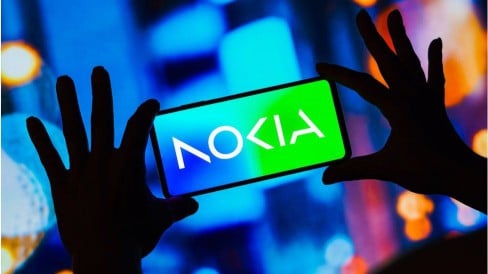
Finnish telecoms giant Nokia is to axe between 9,000 and 14,000 jobs by the end of 2026 to cut costs.
The announcement was made as the company reported a 20% drop in sales between July and September.
The company blamed slowing demand for 5G equipment in markets such as North America.
It currently has 86,000 employees around the world, and has axed thousands of jobs since 2015.
Nokia wants to cut costs by between €800m and €1.2bn (£695m-£1bn) by 2026, it said.
Its customers have been cutting spending amid high inflation and interest rates, it said.
Advances in cloud computing and AI will need "significant investments in networks that have vastly improved capabilities", said chief executive Pekka Lundmark.
"However, given the uncertain timing of the market recovery, we are now taking decisive action," he said.
It said it wanted to "act quickly" by cutting costs by €400m in 2024, and €300m in 2025.
Mr Lundmark added that despite "ongoing uncertainty", Nokia expected to "an improvement in our network businesses" in the current quarter.
The company declined to say where the job cuts would fall, or whether UK employees would be affected.
It said the cuts had been a "difficult business decision" but were "a necessary step to adjust to market uncertainty and protect our long-term profitability and competitiveness".
"We have immensely talented people at Nokia and we will support everyone that is affected by the process," a spokesperson said. "We are now beginning the process of consultation on initial reductions."
The timing and detail of final jobs cuts "will be decided only after careful consideration, and will depend on the evolution of end market demand," the spokesperson added.
Stalling 5G
Nokia was once the biggest handset manufacturer in the world, but it failed to anticipate the popularity of internet-enabled touchscreen phones such as Apple's iPhone and Samsung's Galaxy and was knocked from its perch by rivals.
After selling its handset business to Microsoft, which the software giant later wrote off, Nokia concentrated on telecoms equipment.
It specialises in software and hardware used in telecoms, including the physical and cloud infrastructure people use when making a phone call or when using the internet, such as antennas and base stations.
In 2020, Nokia became a major beneficiary of Huawei being blocked from the UK's 5G networks after striking a deal to become the largest equipment provider to BT.
But 5G equipment makers have been struggling as operators in the US and the EU cut spending.
Nokia and Swedish rival, Ericsson, have been trying to offset some of the weakness with higher sales to India, but 5G rollout has also been slowing down there.
Earlier this week Ericsson reported a fall in sales.
The firm has also laid off thousands of employees this year, and said on Tuesday the uncertainty affecting its business would persist into 2024.
Analyst Kester Mann of CCS Insight said that the telecoms industry should be "flying high, buoyed by unrelenting demand for its services".
"Instead, countless questions continue to be posed around operators' relevance and long-term future," he said.
Technology companies, including telecoms firms, have been struggling as both domestic and business customers have been cutting back on spending because of factors including inflation and higher interest rates.
It has led to thousands of workers around the world losing their jobs over the past two years.
Companies including Meta, which owns Facebook and Instagram, Amazon and X, formerly Twitter, have all made redundancies.
However, tech workers are still in demand.
According to job posting firm Zip Recruiter, 80% of big tech employees who lost their jobs managed to find work within three months.